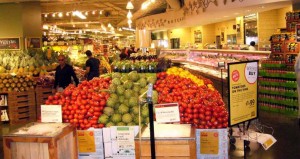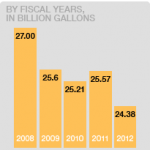 A recent column in The New York Times by Nicholas Kristof, convinced me to turn my attention away from Crimea and focus on a completely different issue which is how our dietary choices affect our natural environment. Kristof cites a new book by Christopher Leonard about Tyson Foods and the concentration of the American meat industry and how that concentration has lowered prices but has had devastating impact on the structure of farming communities and the health of the people who eat the pork, chicken and beef that the system produces.
A recent column in The New York Times by Nicholas Kristof, convinced me to turn my attention away from Crimea and focus on a completely different issue which is how our dietary choices affect our natural environment. Kristof cites a new book by Christopher Leonard about Tyson Foods and the concentration of the American meat industry and how that concentration has lowered prices but has had devastating impact on the structure of farming communities and the health of the people who eat the pork, chicken and beef that the system produces.
Just for the record, I eat turkey once a year on Thanksgiving and do my best to find natural, free range birds. The rest of the year I eat lots of vegetables and fish. When I make lamb on the Barbecue for my daughters and friends I try to either go to the local market where the guy gets it straight from the farm or go to Veritas, a small, Catalan version of Whole Foods that sells organic lamb. It costs more but tastes better and is less likely to pose any health risks.

Whole Foods, of course, has built a $ 12.9 Billion dollar business catering to people who are willing to pay a bit more for food they perceive to be more natural and wholesome. Meanwhile Tyson foods reported sales of $ 34.4 Billion and report that they sell about 20% of the all the beef, chicken, and Pork in the United States!
Tyson also publishes a sustainability report and while they do appear to be reducing water consumption there is no mention of methane.
Food animals and the environment
Although it is not the reason I eat so little meat, the facts are that animal husbandry is a major contributor to greenhouse gas. An article in Scientific American cites a study by the United Nations Food and Agriculture Organization that attributes between 14 and 22% of greenhouse gasses to come from meat production. The EPA says that 8 % of greenhouse gas comes from agriculture and Allianz, an insurance company says livestock methane accounts for 5.1 % of greenhouse gas. Pick a number.
Whatever the CO2 number is there are other ecological costs to raising, slaughtering, and processing meat. According to the chemical company Grace, for example, it takes an astonishing 1,800 gallons of water to produce a pound (400 grams) of beef!
Water Stress and Global Progress
Of all the natural resources we need, water is perhaps the most essential for life and has been getting increasing attention over the last ten years. There is even a web page dedicated to water politics.
In fact, a number of regions are considered under severe water stress and California, which reportedly produced 15 and 7 % of U.S. food in dollar terms in 2012 is experiencing its worst drought in hundreds of years.
Now I do not suggest that anyone become a vegetarian in order to save the planet. I do think that we need to think through the implications , in sustainability terms, of increasing numbers of people from the developing world aspiring to the way of life in the west, including the amount of meat we eat.


